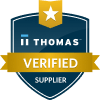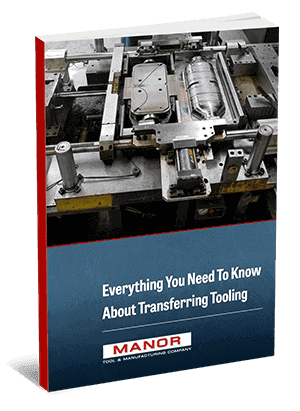Tooling encompasses a sizeable investment in most product manufacturing. Carefully documenting tooling transfer procedures will safeguard production when changing providers due to quality, cost, or logistics issues. Many industries commonly use transfer tooling to take advantage of third-party expertise, including appliances, automotive, aerospace, furniture assemblers, machine shops, medical device manufacturers, sheet metal stampers, and more.
During the tooling development phase, third-party tooling providers often take ownership of a variety of time-consuming, laborious, or specialized tasks, including:
- Design
- Machining
- Heat treating
- Routing
- Barcoding
- Turning
- Pressing
- Debugging
- Final inspection with coordinate measuring machines (CMM)
Manor Tool & Manufacturing Company is a first-class metal stamper with over 60 years of experience. Our team has extensive experience developing and fabricating tooling, and we can also optimize and incorporate transferred tooling into our operation. We work with a variety of metals, such as:
- Aluminum
- Cold-rolled steel
- HSLA
- Spring steel
- Stainless steel
We have earned a reputation for high-quality services, excellent customer service, and competitive pricing, prompting many customers to transfer their stamping dies to us from other suppliers. Read more about the strategies for getting the most from your transfer tooling here.
Checklist for an Effective Transfer Tooling Procedure
Not all tooling transfers are the same. Be as thorough as possible, and be sure to speak with your transfer partnering company about any materials they may need. Additionally, consult with your previous provider about any proprietary info and materials that they must include in the transfer. This checklist will help to ensure nothing gets missed in the transfer between providers. You can download a checklist for your own records by clicking here!
☐ Complete tool drawings
☐ Hard copy
☐ CAD files
☐ Procedures
☐ Tool installation
☐ Debugging
☐ Spare parts list
☐High-risk of repair parts
☐Replacement parts
☐ Spare parts inventory
☐ Spare parts supplier information
☐ Contact info
☐ Pricing
☐ Purchasing history
☐ Complete records
☐ Project management
☐ Tool service
☐ Repair
☐ Complete component QC records
☐ May include inspection data
☐ Component-specific inspection fixtures and their drawings
☐ Final sample strip that represents the last material run off the tool
☐ Verify security or attachment of the tool to the shipping crate
☐ Verify that the shipping paperwork is accurate/complete
☐ Tool
☐ Asset #
☐ Customs declarations
☐ Bill of lading
☐ Correct shipping address
☐ Final verification of the following:
☐ Shut height
☐ Die dimensions
☐ Material thickness and width
☐ Die type
☐ Tonnage requirement
☐ Nitro requirement
☐ Air cushion requirement
☐ Special feed requirement
☐ Straightener requirement
☐ Material specifications
☐ Die shape
☐ Remaining cut edge
☐ Special oil requirements for die
Produce Higher Quality Products With Manor Tool
When you invest in tooling to manufacture your products, make sure you have a defined and easily repeatable transfer tooling process in case issues arise with your third-party provider. Manor Tool has implemented efficient transfer tooling procedures, ensuring a fast and easy transition for our customers. We value close partnerships with our clients and welcome existing and prospective customers to tour our facilities at any time.
If you’d like to learn more about transfer tooling, we invite you to download our eBook. For questions on our products or services, please contact us or request a quote today.
Tags: metal stamping tooling transfer, transfer tooling




